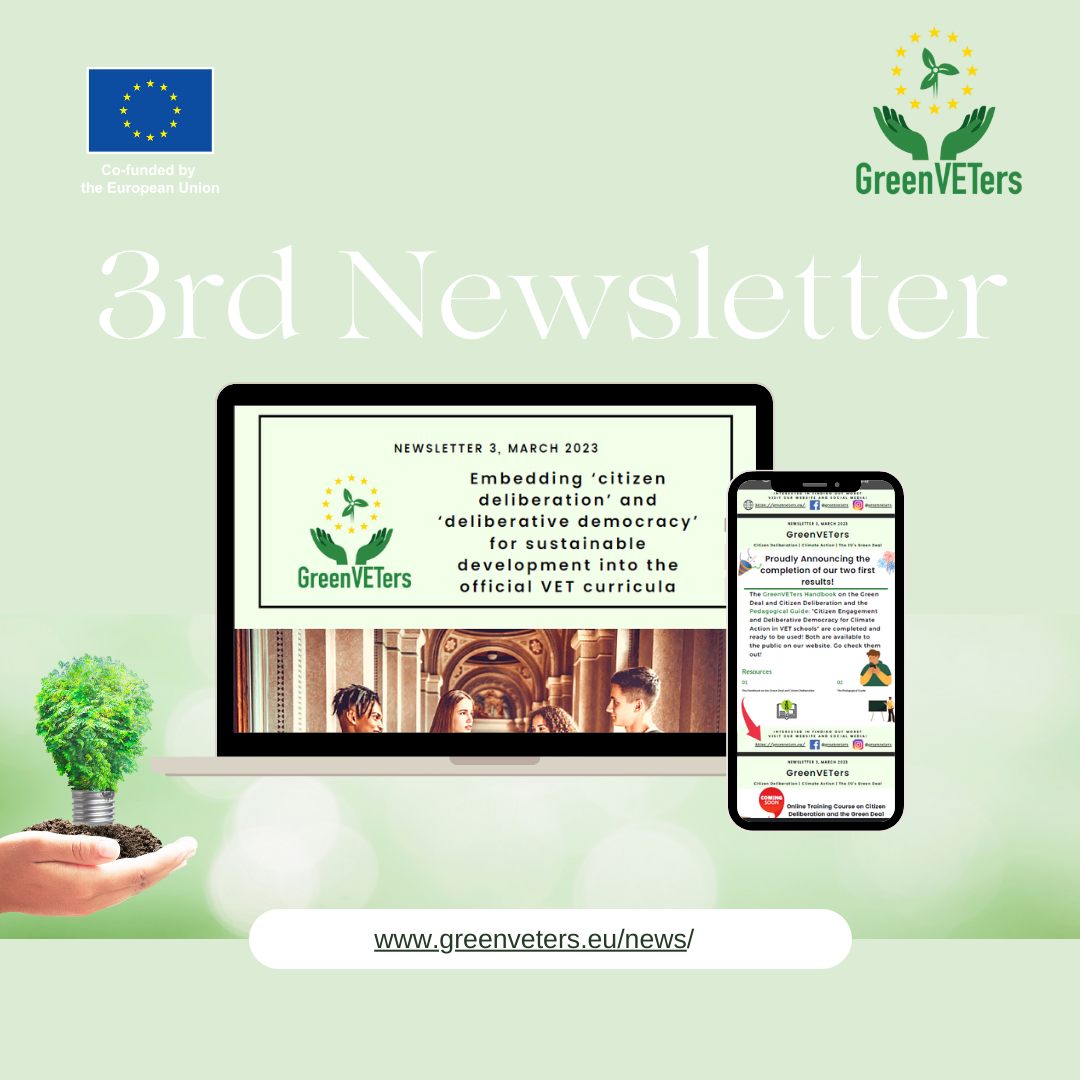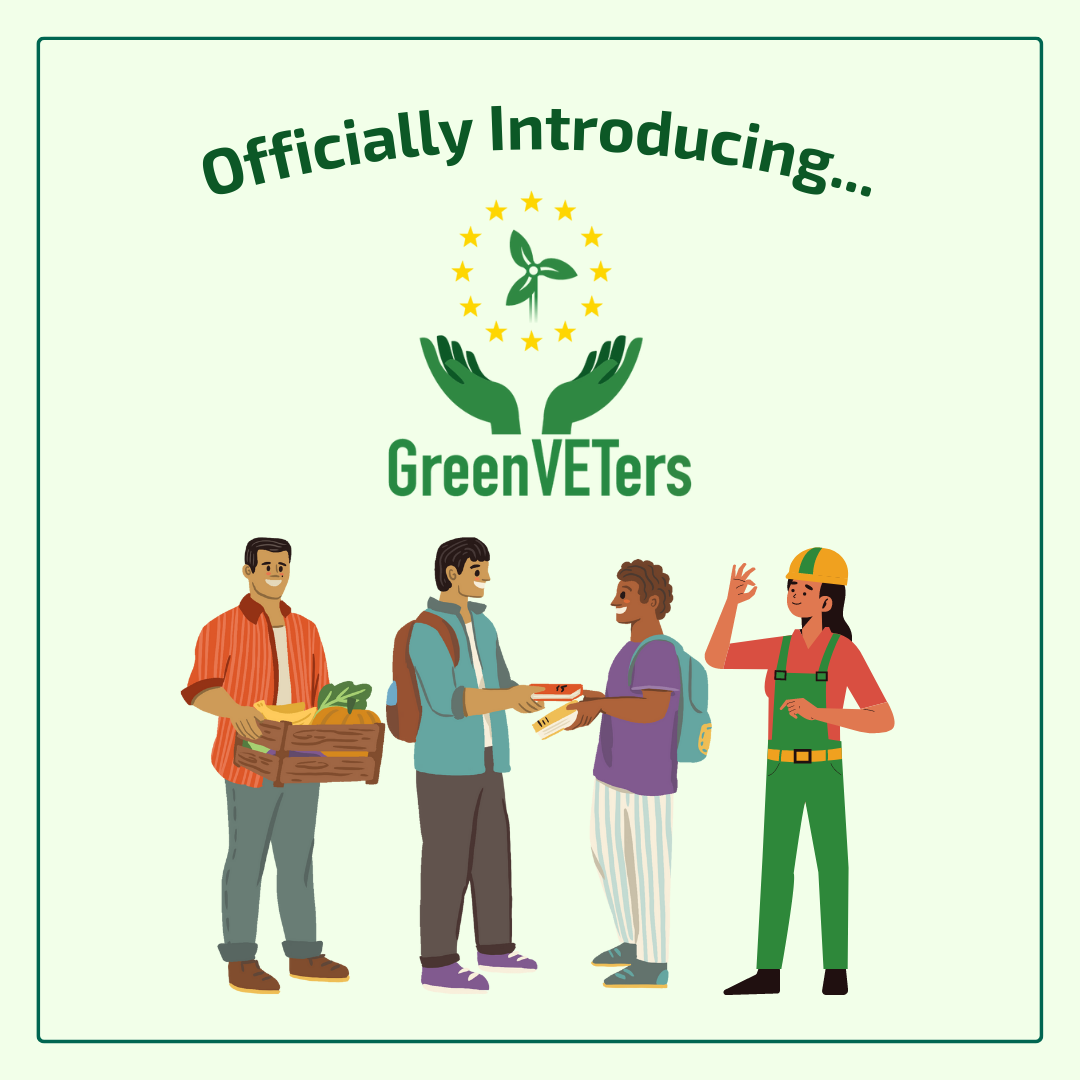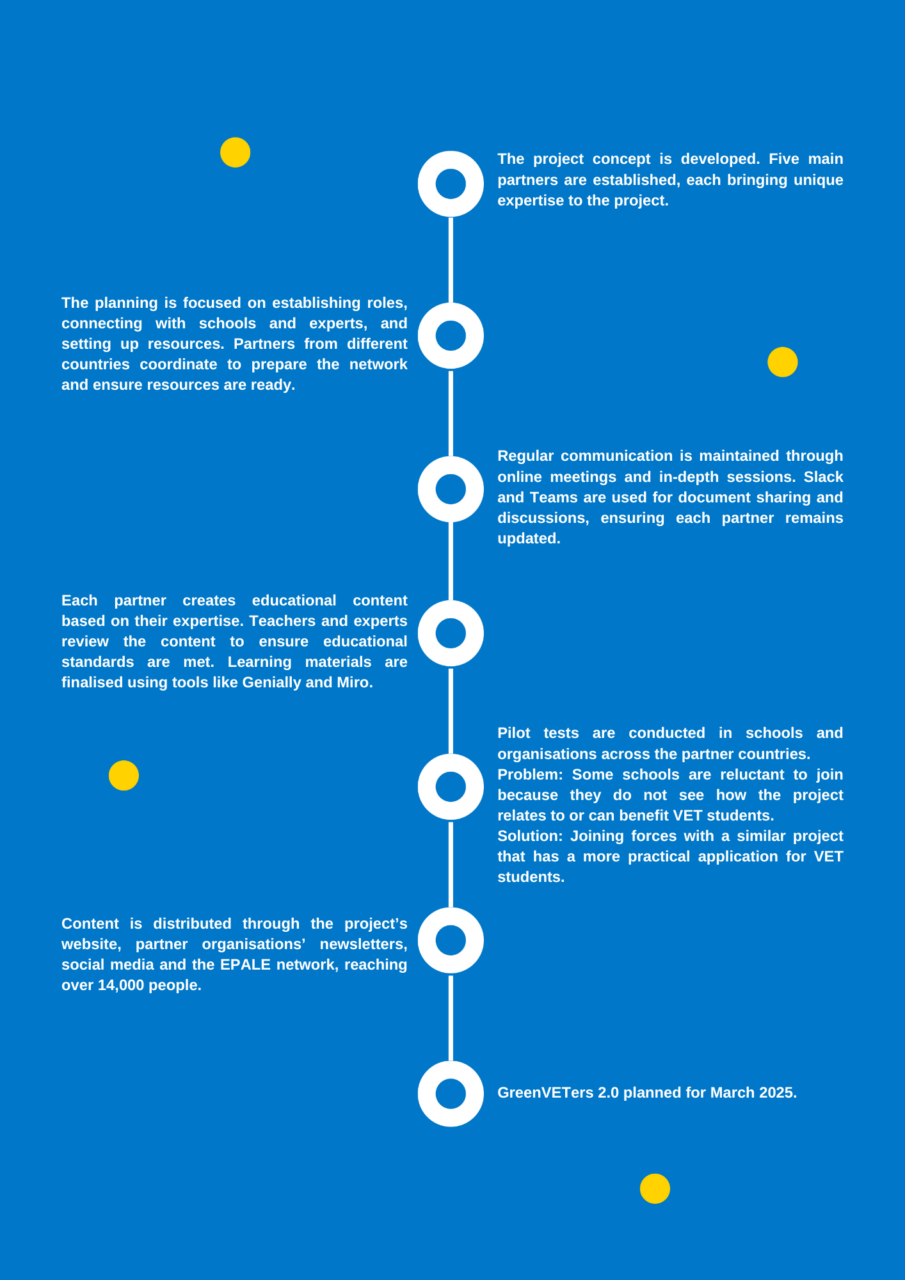For me, it’s very positive that these kinds of seminars are happening. I believe it is important to share and discuss opinions on social issues and encourage communication between students and educators.
The GreenVETers project aims to teach vocational education and training (VET) students about environmental protection, Citizen Deliberation, and the EU’s Green Deal. By providing hands-on training materials, the project brings theoretical concepts to a practical level, highlighting the significance of VET students and ensuring they feel important, valued, and included in sustainability efforts.
It is essential to give vocational students a voice and show them their importance in sustainability efforts. Throughout this project, many of them asked, “Are we really meant to be part of this? We’re not that important, right?” They often feel overlooked compared to university students, but they are the cornerstone of our labour market and future society. Participating in these discussions helps them see their true value and can empower them to take an active role in sustainability.
We talked to Tessa den Bakker, the project manager of GreenVETers, about this initiative’s journey to introduce vocational students to the EU’s Green Deal and environmental protection.
What was the goal of the GreenVETers project?
We wanted to create an online training course and educational materials on environmental protection, energy efficiency, and the sustainable development goals (SDGs) for vocational education and training (VET) teachers and students. Essentially, we aimed to bring theoretical concepts about sustainability and environmental care to a practical, hands-on level for VET students.
What organisations participated in the project, and how were the roles distributed among the partners?
There were five main partners in total. A partner from Cyprus wrote the project proposal, introduced us to the others, and suggested roles based on each partner’s area of expertise. Our organisation, Pro Work, was mostly involved in dissemination and outreach. A Polish partner focused on advising sustainability to farm businesses. Another organisation in Portugal provided training. A Greek partner handled the technical aspects of the project. After an initial call, we all agreed it was a good strategic fit, as each partner brought unique expertise to various parts of the project.
How long did the initial planning and setup phase take?
It took around six to nine months to get the project fully underway. The initial phase involved a lot of coordination and discussions to ensure that we had the right network, resources, and connections to implement everything in our respective countries. Although this was a familiar topic for us, we needed to reconnect with organisations like schools and experts to make sure we had the necessary support.
Coordinating across different countries sounds challenging. How did you manage communication and meetings?
We had initially planned in-person meetings, with the rest held online. However, we learned from the pandemic that we could effectively manage the project with fewer physical meetings and more frequent virtual ones. So, we held monthly online meetings, for short check-ins, and quarterly in-depth sessions, where we discussed progress in greater detail. Regular, consistent communication was essential, along with having one main manager to oversee everything from start to finish. We also had team members who were committed to the project’s goals and a robust network to aid with dissemination and engagement.
Did each partner participate in creating the educational materials?
Yes, each partner was free to create materials based on their expertise. For instance, the Polish partner focused on sustainable farming practices. On top of that, we also had two Dutch teachers and an expert review the materials to ensure they met educational standards. This allowed each partner to contribute their unique skills and experience while ensuring the high quality of the end result.
What challenges did you encounter in presenting these topics to VET students?
Some VET teachers felt that these topics might be too advanced for their students. Other teachers were hesitant, questioning if these concepts fit into vocational training. To overcome this, and to understand their needs, we engaged with the teachers and students directly, asking for their opinions through interviews and Socratic seminars. We refined the materials based on that feedback, though during the pilot tests some teachers still found them somewhat too theoretical for their students.


How many schools participated in pilot tests, and were there any challenges in getting them on board?
Nearly each partner organised pilot tests in their own country. We worked with two schools in the Netherlands, and in total, I think around eight schools participated, as well as five or six organisations related to sustainable building. In the Netherlands, getting schools on board was particularly challenging, as teachers here want to see clear, practical benefits before adopting new content. We managed this by combining our project with another project related to using sustainable energy, which helped make the content more relevant and accessible for VET teachers and students.
What tools and platforms did you use to organise and distribute these materials?
We used tools like Genially for the learning materials and Miro boards for seminar discussions. Genially was particularly useful for creating interactive quizzes, which made the learning process more engaging for students. Our website was the primary platform to host all the content. For further distribution, all the organisations in our consortium shared it via their newsletters. For example, at Pro Work, we sent it to about 800 email addresses in our network. Additionally, we used social media and EPALE, the European network for adult learning. Altogether, I believe our combined reach was over 14,000.
What is the significance of teaching SDGs to VET students in particular?
It is essential to give vocational students a voice and show them their importance in sustainability efforts. They are the foundation of our workforce and can play a significant role in sustainability.
I was a VET student myself, and I remember well the feeling of not being smart enough, not significant enough compared to university students. I started with care work, helping older people in their homes and organising activities for them. And it was the recognition of the importance of my work that made me realise that I could do more, that I wanted to do more. I needed to learn how to present myself, how to move and inspire people, and how to be helpful to others.
I followed a path in communication, marketing, and media, and eventually, I earned my master’s degree.
So, from my personal experience, I firmly believe that projects like GreenVETers can help VET students feel valued and included, and inspire them to contribute to society in many meaningful ways.
Project Roadmap

Project outcomes
The GreenVETers project developed interactive, practical learning materials on sustainability and the EU Green Deal for VET students.
Handbook
This handbook serves as a comprehensive guide for incorporating the EU Green Deal and citizen deliberation into vocational education, offering practical exercises, discussion prompts, and actionable insights.
View solution
Pedagogical Guide
Designed for VET educators, The Pedagogical Guide provides step-by-step instructions and innovative approaches to teach sustainability and the EU Green Deal effectively in classrooms.
View solution
Online training course
This online training course delivers tailored content for VET schools, covering key topics like the EU Green Deal and SDGs, with a focus on practical applications and
critical thinking skills.
View solution
The Report on Good Practices
This report highlights effective strategies and real-world examples of how vocational schools and educators from across Europe are advancing sustainability and promoting the EU Green Deal in practice.
View solution
About the project
Supported by:
Erasmus+ / Cooperation Partnerships
EU Youth Programme Priority:
Participation in Democratic Life
Sustainability, Environmental and Climate Goals
Topic:
Participation in Democratic Life
Visibility:
GreenVETers used its website as a central hub for educational materials, supported by dissemination through EPALE, partner newsletters, and social media channels like Instagram and Facebook.
Organisations involved:
Organisations involved: Foundation Knowledge Centre Pro Work (NL); The Polish Farm Advisory and Training Centre (PL); Web2Learn (GR); C.I.P. Citizens In Power (CY); ESPE/CEPROF School Centers for Vocational Education (PT)











